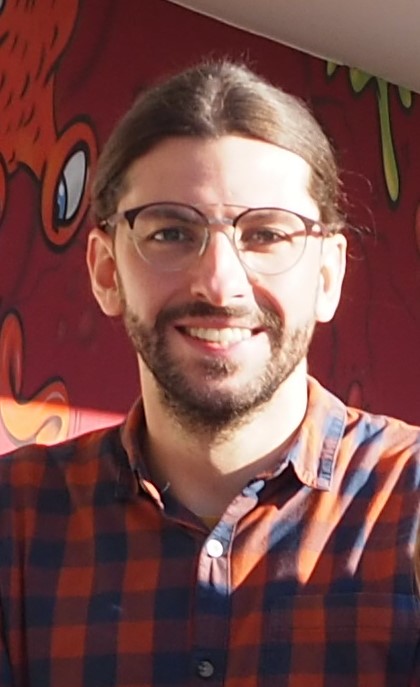LISBP Toulouse, Toulouse University, CNRS, INRA, INSA, Toulouse, France Neutral Genetic Drift-Based Engineering of a Sucrose-Utilizing Enzyme toward Glycodiversification ACS Catalysis, ACS Catal. 2019, 9, 2, 1241-1252 Daudé David, Alizée Vergès, Emmanuelle Cambon, Stéphane Emond, Samuel Tranier, Isabelle André, et Magali Remaud-Siméon
Cv
David Daudé, 33 years old, is an Engineer graduated from the National Institute of Applied Sciences of Toulouse (INSA) in 2009. In 2013, he obtained a PhD degree in Molecular and Enzyme Engineering from the LISBP (University of Toulouse) under the supervision of Prof. Magali Remaud-Siméon and Dr. Isabelle André. During his thesis, he focused on the catalytic promiscuity and evolution of the amylosucrase from Neisseria polysaccharea, an enzyme of prime biotechnological interest for the synthesis of valuable glucoconjugates and oligo- or polysaccharides, from the widely available sucrose substrate. The work entitled “Neutral Genetic Drift-Based Engineering of a Sucrose-Utilizing Enzyme toward Glycodiversification » and published in ACS catalysis, described His contribution to an original directed evolution strategy, namely the neutral genetic drift, for modulating enzyme properties and underlined for the first time the potential of this approach for generating original biocatalysts with unprecedented properties. He is actually Chief Scientific Officer (CSO) of the newly created start-up Gene&GreenTK, a spin-off of Aix-Marseille University created by Prof. Eric Chabrière and Dr. Mikael Elias, that develops extremophilic enzymes for addressing major public health and environmental issues.
Contact
Dr. David Daudé
Chief Scientific and Operating Officer at Gene&GreenTK
IHU Méditerranée Infection
19-21 boulevard Jean Moulin
13005 Marseille
FRANCE
phone: (+33)626784214
website: www.gene-greentk.com
Abstract
Neutral drift (also called purifying selection) is an attractive approach to generate polymorphic variant libraries for enzyme engineering. Here, we have applied this strategy to modify the substrate specificity of a transglucosylase. Our model enzyme, the amylosucrase from Neisseria polysaccharea, is a glucosylation biocatalyst of prime interest because it uses the widespread substrate sucrose as a glucosyl donor and shows broad acceptor promiscuity. A library of 440 functional amylosucrase variants was generated after four rounds of neutral drift at a low mutation rate. The functional variations present in this library were investigated by assaying the ability of these variants to use an alternative glucosyl donor (p-nitrophenyl-α- D -glucopyranoside, pNP-Glc) and to glucosylate a range of acceptors (including methyl-α- L -rhamnopyranoside, which is not naturally recognized by the parental enzyme). The impact of these mutations on the thermal stability of the variants was also assessed. Large variations of acceptor promiscuity were observed, ranging from the complete loss of detectable activity to a 2-fold increase relative to the parental enzyme. Variants showing increased catalytic efficiency toward the alternative pNP-Glc donor were also identified. Specifically, one variant combining four unprecedented amino acid changes was 25-fold more efficient at utilizing pNP-Glc than the parental enzyme and acquired glucosylation activity toward methyl-α- L -rhamnopyranoside. Enzymes with improved thermal stability were also identified. Overall, our work demonstrates that neutral drift is an effective and powerful strategy to engineer transglycosylases with enhanced or even acquired substrate specificities from small-sized functional libraries compatible with accurate low-throughput multi-parameter analyses.




